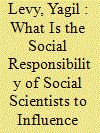| Srl | Item |
| 1 |
ID:
093694


|
|
|
|
|
| Publication |
2009.
|
| Summary/Abstract |
The objective of this article is to examine the practical outcomes of a human rights education course/exchange program conducted in South Africa between 2001 and 2005. Data for the study were obtained from observation, interviews, focus groups, program reports and annual evaluation instruments. The study reveals that undergraduate exchange programs which involve a focus on human rights can have a significant impact on undergraduate's research and career plans. The recommendation is that such programs develop and maintain open and equitable administrative structures that adhere to the principles outlined in formal program documents.
|
|
|
|
|
|
|
|
|
|
|
|
|
|
|
|
| 2 |
ID:
105412


|
|
|
|
|
| Publication |
2011.
|
| Summary/Abstract |
In the increasing amount of published research and critical commentary on sport for development and Peace (sdp) two related trends are apparent. The first is a clear belief that, under certain circumstances, sport may make a useful contribution to work in international development and peace building; the second is that criticisms of it are frequently constructive, intended to support the work of practitioners in the field by outlining the limitations of what may be achieved through sport, and under what circumstances. Given these trends, public sociology provides a useful framing device for research and commentary and academics should now engage more directly with practitioners and provide more accessible summaries of their research to those engaged in sdp. We provide a brief introduction to public sociology, and outline its relevance in the sociology of sport, before making suggestions about the incorporation of public sociology into sdp research. Three main overlapping areas of research emerge from a public sociology perspective, and are needed in order to engage in a constructively critical analysis of sdp: descriptive research and evaluation; analyses of claims making; and critical analyses of social reproduction. The paper concludes with a brief examination of the dilemmas that may be encountered by those engaging in public sociology research, in both the academy and the field.
|
|
|
|
|
|
|
|
|
|
|
|
|
|
|
|
| 3 |
ID:
188786


|
|
|
|
|
| Summary/Abstract |
Mainstream scholars of IR favor policy-relevant research, that is the agenda to influence government policymakers by offering policy recommendations. In this article, I offer a different perspective by presenting alternative arguments about social scientists’ responsibility to influence. By drawing on themes of public sociology and critical sociology, security studies and public policy, I argue that the core of this responsibility is to seek to influence policy via engagement with the public rather than with policymakers.
|
|
|
|
|
|
|
|
|
|
|
|
|
|
|
|
| 4 |
ID:
180567


|
|
|
|
|
| Summary/Abstract |
What makes a migration expert? Taking Bourdieu’s understanding of the academic field as its point of departure, this article outlines the field of migration research in Denmark. Migration and integration are heavily politicised topics in Denmark as in many other countries. The migration field has also been influenced by this politicisation. The migration research field is an open field which means that academic knowledge producers are not the only actors within this field. Neither are they necessarily the ones recognised the most. The article outlines different types of experts which in different ways signal a change of hierarchies within the field. Not the only one but the dominating ones. The last years we have seen a research field characterised by different academic positions but also an expansion of the field with an increased importance given to boundary organisations. The article discusses what the implications for doing migration research might be.
|
|
|
|
|
|
|
|
|
|
|
|
|
|
|
|